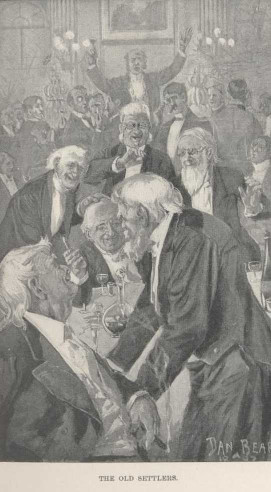I was in Adelaide again, some months later, and saw the multitudes gather in the neighboring city of Glenelg to commemorate the Reading of the Proclamation—in 1836—which founded the Province. If I have at any time called it a Colony, I withdraw the discourtesy. It is not a Colony, it is a Province; and officially so. Moreover, it is the only one so named in Australasia. There was great enthusiasm; it was the Province's national holiday, its Fourth of July, so to speak. It is the pre-eminent holiday; and that is saying much, in a country where they seem to have a most un-English mania for holidays. Mainly they are workingmen's holidays; for in South Australia the workingman is sovereign; his vote is the desire of the politician—indeed, it is the very breath of the politician's being; the parliament exists to deliver the will of the workingman, and the government exists to execute it. The workingman is a great power everywhere in Australia, but South Australia is his paradise. He has had a hard time in this world, and has earned a paradise. I am glad he has found it. The holidays there are frequent enough to be bewildering to the stranger. I tried to get the hang of the system, but was not able to do it.
You have seen that the Province is tolerant, religious-wise. It is so politically, also. One of the speakers at the Commemoration banquet—the Minister of Public Works-was an American, born and reared in New England. There is nothing narrow about the Province, politically, or in any other way that I know of. Sixty-four religions and a Yankee cabinet minister. No amount of horse-racing can damn this community.
The mean temperature of the Province is 62 deg. The death-rate is 13 in the 1,000—about half what it is in the city of New York, I should think, and New York is a healthy city. Thirteen is the death-rate for the average citizen of the Province, but there seems to be no death-rate for the old people. There were people at the Commemoration banquet who could remember Cromwell. There were six of them. These Old Settlers had all been present at the original Reading of the Proclamation, in 1836. They showed signs of the blightings and blastings of time, in their outward aspect, but they were young within; young and cheerful, and ready to talk; ready to talk, and talk all you wanted; in their turn, and out of it. They were down for six speeches, and they made 42. The governor and the cabinet and the mayor were down for 42 speeches, and they made 6. They have splendid grit, the Old Settlers, splendid staying power. But they do not hear well, and when they see the mayor going through motions which they recognize as the introducing of a speaker, they think they are the one, and they all get up together, and begin to respond, in the most animated way; and the more the mayor gesticulates, and shouts "Sit down! Sit down!" the more they take it for applause, and the more excited and reminiscent and enthusiastic they get; and next, when they see the whole house laughing and crying, three of them think it is about the bitter old-time hardships they are describing, and the other three think the laughter is caused by the jokes they have been uncorking—jokes of the vintage of 1836—and then the way they do go on! And finally when ushers come and plead, and beg, and gently and reverently crowd them down into their seats, they say, "Oh, I'm not tired—I could bang along a week!" and they sit there looking simple and childlike, and gentle, and proud of their oratory, and wholly unconscious of what is going on at the other end of the room. And so one of the great dignitaries gets a chance, and begins his carefully prepared speech, impressively and with solemnity—
"When we, now great and prosperous and powerful, bow our heads in reverent wonder in the contemplation of those sublimities of energy, of wisdom, of forethought, of——"
Up come the immortal six again, in a body, with a joyous "Hey, I've thought of another one!" and at it they go, with might and main, hearing not a whisper of the pandemonium that salutes them, but taking all the visible violences for applause, as before, and hammering joyously away till the imploring ushers pray them into their seats again. And a pity, too; for those lovely old boys did so enjoy living their heroic youth over, in these days of their honored antiquity; and certainly the things they had to tell were usually worth the telling and the hearing.
It was a stirring spectacle; stirring in more ways than one, for it was amazingly funny, and at the same time deeply pathetic; for they had seen so much, these time-worn veterans, and had suffered so much; and had built so strongly and well, and laid the foundations of their commonwealth so deep, in liberty and tolerance; and had lived to see the structure rise to such state and dignity and hear themselves so praised for their honorable work.
Commemorating the Reading of the Proclamation of 1836
scott
29 November 2021
© 2026 Twain's Geography, All rights reserved.